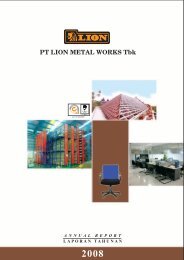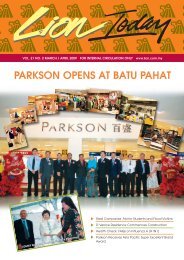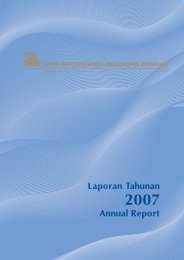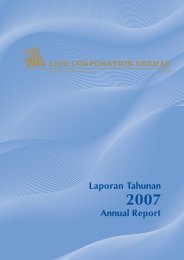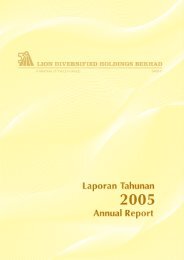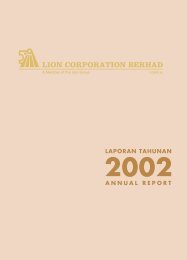continued - The Lion Group
continued - The Lion Group
continued - The Lion Group
You also want an ePaper? Increase the reach of your titles
YUMPU automatically turns print PDFs into web optimized ePapers that Google loves.
3. SIGNIFICANT ACCOUNTING POLICIES (<strong>continued</strong>)<br />
(b) Revenue Recognition<br />
Revenue is recognised to the extent that it is probable that the economic benefits will flow to the <strong>Group</strong><br />
and the revenue can be reliably measured. <strong>The</strong> following specific recognition criteria must also be met<br />
before revenue is recognised:<br />
(i) Sale of Goods and Services<br />
Revenue is recognised net of sales taxes, returns and discounts and upon transfer of significant risks<br />
and rewards of ownership to the buyer. Revenue is not recognised to the extent where there are<br />
significant uncertainties regarding recovery of the consideration due, associated costs or the possible<br />
return of goods.<br />
(ii) Interest Income<br />
Interest income is recognised on an accrual basis using the effective yield method.<br />
(iii) Dividend Income<br />
Dividend income is recognised when the <strong>Group</strong>’s right to receive payment is established.<br />
(iv) Development Properties<br />
Revenue from sale of development properties is accounted for by the stage of completion method.<br />
<strong>The</strong> stage of completion is determined by reference to the costs incurred to date to the total estimated<br />
costs where the outcome of the projects can be reliably estimated.<br />
(v) Rental Income<br />
(c) Employee Benefits<br />
Rental income is recognised on a straight-line basis over the term of the lease.<br />
(i) Short Term Benefits<br />
Wages, salaries, bonuses and social security contributions are recognised as expenses in the<br />
financial year in which the associated services are rendered by employees of the <strong>Group</strong>. Short term<br />
accumulating compensated absences such as paid annual leave are recognised when services are<br />
rendered by employees that increases their entitlement to future compensated absences, and short<br />
term non-accumulating compensated absences such as sick leave are recognised when the absences<br />
occur.<br />
(ii) Defined Contribution Plans<br />
Defined contribution plans are post-employment benefit plans under which the <strong>Group</strong> pays fixed<br />
contributions into separate entities or funds and will have no legal or constructive obligation to pay<br />
further contributions if any of the funds do not hold sufficient assets to pay all employee benefits<br />
relating to employee services in the current and preceding financial years. Such contributions are<br />
recognised as an expense in the income statement as incurred. As required by law, companies in<br />
Malaysia make such contributions to the Employees Provident Fund (“EPF”).<br />
45



